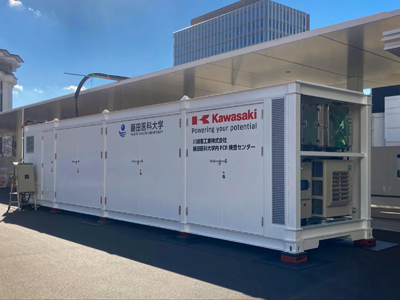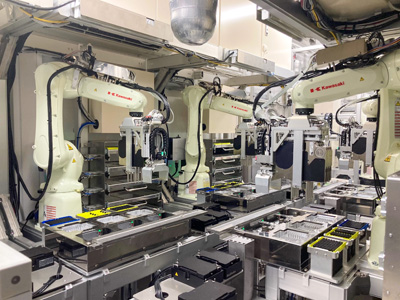Kawasaki Launches Nation's First Automated PCR Testing Services, Operated Using Kawasaki Robots, at Fujita Health University
Feb. 04, 2021
 |
 |
|
Automated PCR testing system deployed by Kawasaki |
||
Tokyo, February 4, 2021 — Kawasaki Heavy Industries, Ltd. announced today the completion of installation for Japan's first automated polymerase chain reaction (PCR) testing system, which operates using Kawasaki-made robots, at Fujita Health University in Aichi Prefecture. In addition, the company announced the start of testing services using the new PCR testing system, in collaboration with the University, at the Kawasaki Heavy Industries, Ltd. PCR Testing Center at Fujita Health University.
Kawasaki intends to start by verifying the effectiveness of the new PCR testing system in a medical application through joint research with Fujita Health University. At the same time, Kawasaki will proceed with registration as a clinical laboratory and, once registration is complete, begin offering full-out PCR testing services through the Kawasaki Heavy Industries, Ltd. PCR Testing Center at Fujita Health University. When carrying out PCR tests, Kawasaki will use the new PCR testing system on samples collected by the University, then send the results back to the University for final determinations. Since December 2020, the University has been carrying out tests at a maximum rate of 1,500 samples per day. When the new PCR testing system enters into full operation, it will be possible to test up to 2,500 additional samples daily for a total of up to 4,000 samples per day, which is one of Japan's highest testing rates for a single facility.
Past collaborative projects in the medical field by Kawasaki and Fujita Health University have included the establishment of research and verification testing facilities for training and remote surgical operations using the hinotori™ Surgical Robot System, Japan's first surgical support robot system developed by Medicaroid Corporation jointly together with Kawasaki and Sysmex Corporation. By eliminating the need for human personnel in and automating all stages of the PCR testing process, Kawasaki and these two other companies strive to protect medical workers from infection risk while expanding and bolstering PCR testing capabilities. To these ends, the companies have pursued system development with support from the Hyogo Prefecture and Kobe City.
Kawasaki, working together with Fujita Health University on this project, is deploying its PCR testing services as a way of supporting medical workers in Japan on the front lines of efforts to beat the novel coronavirus disease (COVID-19). The company will utilize the system at airports and other such public locations with the aim of helping people to engage in normal activities more freely again and thus restart and revitalize economic activities.
Advantages of Kawasaki's Automated PCR Testing System
- Shorter testing times (completed within 80 minutes) while still using a globally authorized PCR testing method
- Automation and elimination of human workers by the use of robots in the PCR testing process to reduce the burden on doctors and other medical workers
- Remote monitoring for greater safety, simplified operations and reduced labor demand
- Large-volume testing using robots in accordance with methods recommended by the Japanese Ministry of Health, Labour and Welfare and by medical associations
- Designed to meet space-saving needs (system fits into a 40-foot container)
- System built in a movable container, enabling its use at various event venues and other locations
| Overview of Kawasaki's Automated PCR Testing System | |
|---|---|
| External dimensions | 12.2 m long, 2.5 m wide, 2.9 m tall (system unit) |
| Testing capacity | Testing capacity |
Contact
If you need more information about our business,
please feel free to contact us.





